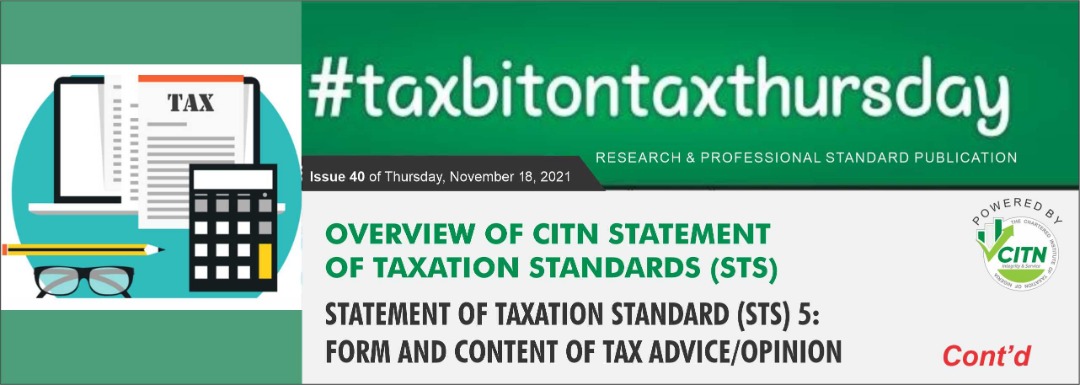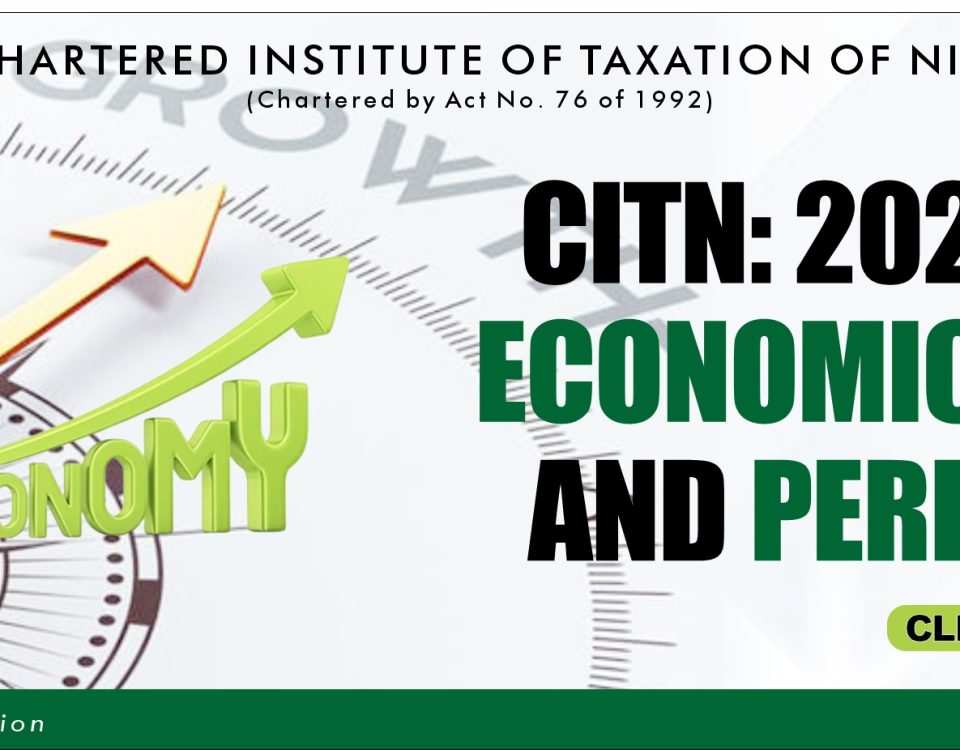- Have any questions?
- 09080888815
- 092918349
- citn@citn.org
Overview of CITN Statement of Taxation Standards (STS) – Statement of Taxation Standard (STS) 5: Form and Content of Tax Advice/Opinion

Overview of CITN Statement of Taxation Standards (STSs)4 – Previously Agreed Tax Return Filing Position
November 15, 2021
CITN President completed Senior Executive Course 43, 2021 at the National Institute for Policy and Strategy Studies, Kuru-Jos Plateau State
November 21, 2021Introduction
The CITN Statement of Taxation Standard (STS) Five on Form and Content of Tax Advice/Opinion sets out guidance for members on certain aspects of providing advice to a client. The Statement also comments on circumstances in which a member has a responsibility to communicate with a client when subsequent developments affect advice that has previously been provided. However, this standard does not cover a member’s responsibilities when the expectation is that the advice rendered is likely to be relied upon by parties other than the client.
The CITN Statement of Taxation Standard (STS) Five was issued and gazetted in the Federal Republic of Nigeria Official Gazette Vol. 100 of June 2013. The standard became effective from 1st January 2013. It is divided into five sections:
- Part 1 (One)- The introduction
- Part 2 (Two)- Explanatory Notes
- Part 3 (Three)- Taxation Standard
- Part 4 (Four) – Compliance with Legal Requirements
- Part 5 (Five) – Effective Date
Parts 1, 2 and 3 present the standards, Part 4 requires compliance with any disclosure requirement of the Companies Income Tax Act CAP C21, Laws of the Federation of Nigeria 2004 as amended to date, the Personal Income Tax Act and any other relevant laws. Part 5 discloses the effective date of the Standard, which is 1 January 2013.
Guidance on STS Five
- Before giving advice to a client, it is important that the member identifies/ clarifies the following issues:
- The purpose of the advice
- The scope of the advice
- Who is to rely on the advice?
- The risk of reliance
The issues above should be reflected in the engagement letter confirming the client’s instructions to the member and the terms on which the advice is to be provided.
- The engagement should outline among other things, issues of the extent and applicability of confidentiality privileges as protected by law.
- A member should use his judgment to ensure that tax advice provided to a taxpayer reflects professional competence and appropriately serves the taxpayer’s need. A member is not required to follow a standard format or guideline in communicating written or oral advice to a taxpayer.
- A member should assume that tax advice provided to a taxpayer will affect the manner in which the matters or transactions considered would be reported on the taxpayer’s tax returns. Thus, for any tax advice given to a taxpayer, a member should follow the Statement of Taxation Standard (STS) No. 3, Procedural Aspects of Tax Returns.
- When a member is offering a professional advice, efforts should be made to use precautionary language such as “the advice is based on facts as stated and authorities, which are subject to change as the advice was based on the existing situation”.
- A member has no obligation to communicate with a taxpayer when subsequent developments affect advice previously provided with respect to significant matters, except while assisting a taxpayer in implementing procedures or plans associated with the advice provided or when a member undertakes this obligation by specific agreement.
- Where a member obtains specialist advice from a third party on a particular topic and relays this to the client, the member assumes responsibility for the advice in the context of the client’s requirements.
Conclusion
Tax advice is valuable service provided by professional tax practitioners. The form of advice may be oral or written; the subject matter may range from routine to complex. Since the range of advice is so extensive and because advice should meet the specific needs of a taxpayer, there is no single standard format or guideline for communicating to a taxpayer that can suit all circumstances. Hence, this Standard has outlined basic guidelines to assist members of the Institute when rendering such services to their clients.
The Institute’s Statement of Taxation Standards 1 to 9, and Professional Rules and Practice Guidelines can be assessed using the following link https://app.citn.org/home/tpgs.



